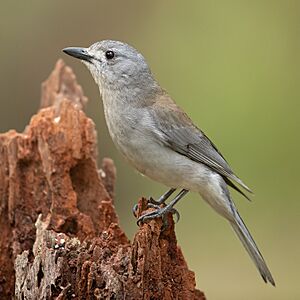Grey shrikethrush facts for kids
Quick facts for kids Grey shrike-thrush |
|
|---|---|
 |
|
| Colluricincla harmonica harmonica | |
| Conservation status | |
| Scientific classification |
|
| Kingdom: | Animalia |
| Phylum: | Chordata |
| Class: | Aves |
| Order: | Passeriformes |
| Family: | Pachycephalidae |
| Genus: | Colluricincla |
| Species: |
C. harmonica
|
| Binomial name | |
| Colluricincla harmonica (Latham, 1801)
|
|
| Subspecies | |
|
See text |
|
| Script error: The function "autoWithCaption" does not exist. | |
| Synonyms | |
|
|
Script error: No such module "Check for conflicting parameters".
The Grey Shrike-thrush (Colluricincla harmonica) is a special songbird. It lives in Australia and New Guinea. You can find it in most parts of Australia, but not in the driest deserts. People used to call it the "grey thrush."
Contents
About the Grey Shrike-thrush
The Grey Shrike-thrush is a medium-sized bird. It is about 24 centimeters (9.4 inches) long. This bird does not have bright colors. It is mostly grey, brown, and white.
Amazing Songs and Sounds
Even though it is not colorful, the Grey Shrike-thrush is famous for its beautiful singing. It has an amazing gift for ringing melodies. Many people think its song is one of the best in Australia. Only birds like the lyrebird might sing as well.
Where the Grey Shrike-thrush Lives
The Grey Shrike-thrush lives in many different places. You can find it in forests, woodlands, and even gardens. It likes areas with trees and bushes. This bird is quite common in many parts of Australia. It is also found in New Guinea.
Different Kinds of Grey Shrike-thrushes
There are five main types, or subspecies, of the Grey Shrike-thrush. They look a bit different depending on where they live. Here are some of them:
- C. h. brunnea: Found in northern Australia and Melville Island.
- C. h. superciliosa: Lives in eastern New Guinea and parts of north-eastern Australia.
- C. h. harmonica: This type is found in eastern Australia.
- C. h. strigata: You can find this one in Tasmania and nearby islands.
- Western Shrike-thrush (C. h. rufiventris): This type lives in western, southern, and central Australia.
Status of the Grey Shrike-thrush
The Grey Shrike-thrush is not in danger. Scientists check on animals to see if they are safe. This bird is listed as "least concern" on the IUCN Red List. This means there are many of them, and their numbers are stable.
Gallery
-
A Grey Shrike-thrush in Dorrigo, NSW, Australia.






